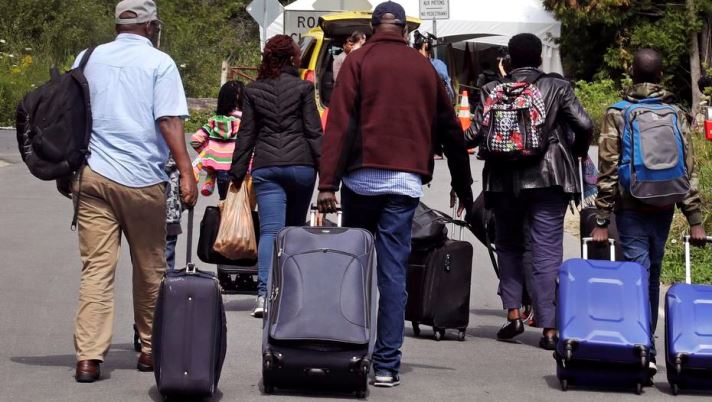The Federal Government said, on Thursday, it had not received any official communication regarding the deportation of Nigerians from the United States to Ghana.
This followed reports that Ghana had accepted Nigerians and other West Africans deported from the US under a new arrangement.
According to Reuters, President John Mahama disclosed on Wednesday that a first batch of 14 deportees, made up of Nigerians, a Gambian and others, had already arrived in Accra, with the Ghanaian authorities facilitating their return to their respective countries.
The report was not specific about the number and identity of Nigerians among the deportees.
Mahama was quoted as saying, “We were approached by the US to accept third-party nationals who were being removed from the US, and we agreed with them that West African nationals were acceptable because all our fellow West Africans don’t need a visa to come to our country,” he said.
He justified the decision by saying West Africans “don’t need a visa anyway” to come to Ghana.
Reacting to enquiries on development, the spokesperson for the Ministry of Foreign Affairs, Kimiebi Ebienfa, told our correspondent on Thursday, “We have yet to be informed officially.”
The United States had previously approached several African nations with proposals to accept deported migrants, a move that drew criticism across the continent.
Nigeria had strongly opposed any such arrangement resembling those involving countries like Rwanda, Eswatini, Ghana, and South Sudan that have agreed to receive foreign nationals expelled from the United States of America.
The Minister of Foreign Affairs, Yusuf Tuggar, had in July revealed that the President Donald Trump administration was mounting pressure on African countries to accept deportees convicted of crimes into African countries under his “third-country deportation” policy.
“The US is mounting considerable pressure on African countries to accept Venezuelans to be deported from the US, some straight out of prisons,” Tuggar said.
He described the move as “unacceptable” and warned that such a policy would unfairly burden countries like Nigeria, which are already grappling with their own internal challenges.
Although Tuggar did not reveal the details of the diplomatic pressure being mounted on African countries, the Trump administration had previously announced new visa policies for Nigeria and others.
Commenting on Wednesday’s revelation, retired Ambassador Rasheed Akinkuolie said the decision to receive Nigerian deportees falls within Ghana’s sovereign rights.
“The government of Ghana has the right to accept deportees from the USA. It is an internal affair of the country, and the reasons for taking such a decision cannot be questioned by another country. What Ghana will do with the deportees is left for the country to sort out,” Akinkuolie said.
Another retired diplomat, Ambassador Ogbole Amedu-Ode, said the move appeared to be driven by logistics rather than any bilateral agreement with Nigeria.
“Ghana is accepting US deportees of West African extraction. This is at the instance of the US. Recall that Nigeria had earlier rejected a US request for the same purpose, albeit, deportees of Venezuelan extraction,” Amedu-Ode said.
He explained that Ghana’s decision may be tied to the fact that citizens of ECOWAS countries do not require visas to enter Ghana.
“Ghana’s reason for accepting these migrants is that, being citizens of West African countries, they’d not require visas to enter Ghana en route to their countries of origin,” he added.
Another Retired Nigerian Ambassador, Mohammed Mabdul, noted that while the move may reduce short-term pressure on other host countries, it could also complicate Nigeria-Ghana relations if not handled diplomatically.
“We’ve had disputes in the past, especially around the treatment of Nigerian traders in Ghana. Deportation issues must be managed carefully to avoid reigniting tensions,” he said.
Mabdul concluded that any country — including Nigeria — has the right to deport foreign nationals who pose security risks or violate laws, but emphasised that such actions must be based on mutual agreement and respect between nations.
“As long as deportation is done through proper channels and with verified information, there is no issue. But when countries like the US act unilaterally, without consultation or due process, it creates serious diplomatic challenges,” he said.
In June, the US Department of State revised its visa policy for Nigerian nationals, introducing more restrictive terms for most non-immigrant, non-diplomatic visas.
According to the new policy, most Nigerian citizens seeking to enter the US will be issued single-entry visas valid for just three months.
In August, the US Mission in Nigeria mandated that all visa applicants submit a five-year history of their social media usage.
The US Embassy announced the policy via its official X (formerly Twitter) account, stating that applicants must list all social media usernames or handles used in the last five years on the DS-160 visa application form.
The Trump administration has been threatening countries that refuse to cooperate with US deportation efforts with visa sanctions under Section 243(d) of the Immigration and Nationality Act, which authorises the US to suspend visas to countries that obstruct deportations.
In April, the US threatened to revoke all visas held by South Sudanese passport holders and to restrict any further issuance to prevent entry into the country over the African country’s initial refusal to accept the return of its repatriated citizens.
The US Secretary of State, Marco Rubio, made the threat in a statement posted on his X (formerly Twitter) account on April 5, 2025.
“I am taking actions to revoke all visas held by South Sudanese passport holders and to restrict any further issuance to prevent entry into the United States, effective immediately, due to the failure of South Sudan’s transitional government to accept the return of its repatriated citizens in a timely manner,” he wrote.
Rubio also said that the US would “prevent further issuance to prevent entry into the United States by South Sudanese passport holders.”
The controversial “third-country deportation” policy was formally revived after a US Supreme Court ruling on June 23, 2025, which cleared the legal path for sending deportees to countries other than their own.
The policy allows the US to send deportees to foreign nations other than their country of origin, particularly when the individual’s home country refuses to take them back.
According to the Institute for Security Studies, Africa, the US paid El Salvador US$5m in March to incarcerate over 250 Venezuelan deportees accused of gang affiliations, in a maximum-security prison notorious for human rights abuses.
Since then, the Trump administration has expanded this policy to Africa, with recent deportations of individuals from countries such as Vietnam, Jamaica and Yemen to South Sudan, Eswatini, Rwanda, and Ghana. The Department of Homeland Security justified the decision by saying their home countries refused “to take them back.”
South Sudan was the first African country to accept deportees under Trump’s revived “third-country deportation” policy. In July, the US Supreme Court approved the deportation of eight men, reportedly convicted of violent crimes and lacking US legal status, to South Sudan.
Eswatini, a Southern African country, followed shortly after, receiving five individuals from countries like Vietnam, Jamaica, Cuba, Yemen, and Laos.
Rwanda later agreed to receive up to 250 deportees from the US, though under terms that allow it to exercise discretion over who to accept.









